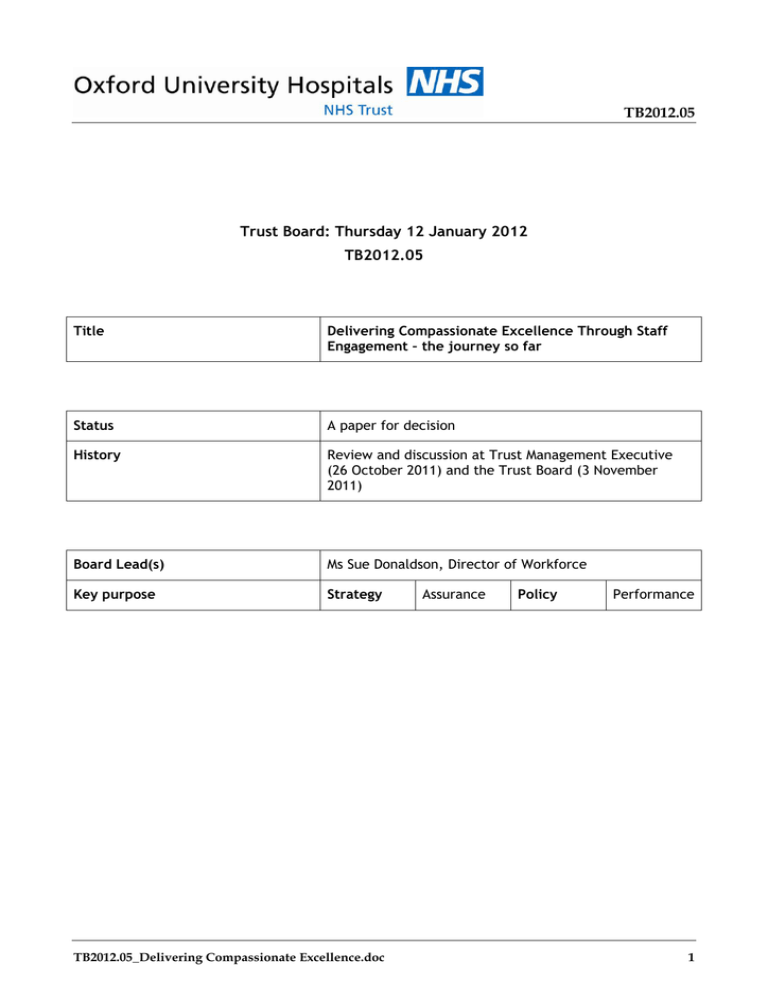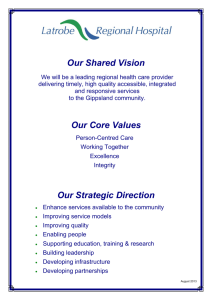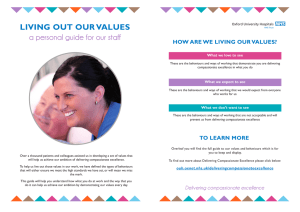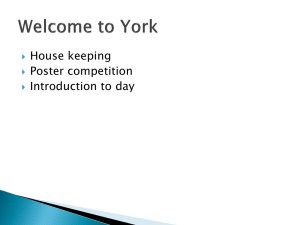TB2012.05 Trust Board: Thursday 12 January 2012
advertisement

TB2012.05 Trust Board: Thursday 12 January 2012 TB2012.05 Title Delivering Compassionate Excellence Through Staff Engagement – the journey so far Status A paper for decision History Review and discussion at Trust Management Executive (26 October 2011) and the Trust Board (3 November 2011) Board Lead(s) Ms Sue Donaldson, Director of Workforce Key purpose Strategy TB2012.05_Delivering Compassionate Excellence.doc Assurance Policy Performance 1 Oxford University Hospitals TB2012.05 Summary This paper outlines: a) A statement of the importance of developing and sustaining engagement with staff in support of the delivery of the Trust‟s strategic objectives; b) An overview of the „values exercise‟ conducted during September and November 2011 which included conversations with over 750 staff, discussion at a number of management meetings and other key stakeholders, including the OUH Patient Panel; c) A final proposal for our new values; and d) The recommended next steps for „Delivering Compassionate Excellence through Staff Engagement‟ as outlined in outlined in the recommendations and Appendix 6. The Trust Board is asked to note the findings and to approve: 1. The final proposal for our new corporate values 2. The proposal for the next steps in „Delivering Compassionate Excellence through Staff Engagement. Ms Sue Donaldson Director of Workforce TB2012.05_Delivering Compassionate Excellence.doc 2 Oxford University Hospitals TB2012.05 Delivering Compassionate Excellence through Staff Engagement – the journey so far Background 1. In previous presentations to the Trust Board we have emphasised the importance of staff engagement in achieving the Trust‟s strategic objectives; in transforming our organisation into an exemplar of a high performing healthcare organisation. 2. The REAL framework was discussed and agreed by the Trust Board in June 2011, (reference BiC2011.06, Delivering Compassionate Excellence through Staff Engagement) and a summary is contained in Appendix 1. This framework underpins a 3 to 5 year programme of work to increase engagement and raise standards. Introduction 3. The first priority identified in the staff engagement programme was to review the Trust values. This paper outlines the findings of the values exercise that was held from September to November 2011. 4. Feedback was received from over 750 staff, the Trust Board, a number of management committees and from focus groups held with our Patient Panel and Partners. 5. The values exercise was seen as a key part of the integration process between the Nuffield Orthopaedic Centre (NOC) and Oxford Radcliffe Hospitals (ORH). Discussions were held on all sites and centred on what individuals, teams and departments said was important to them. This feedback has informed the development of the proposed corporate values for the Oxford University Hospitals NHS Trust. 6. Trust Board is asked to approve the final proposals for our new corporate values and the next steps in „Delivering Compassionate Excellence‟ through Staff Engagement. Findings 7. Key and consistent themes that emerged from the feedback from all of the groups from the values exercise were around: Care Respect Value Service 8. In addition to the above values, the Patient Panel feedback particularly highlighted the values of dignity, respect and compassion. Staff feedback highlighted themes of good communication, team working and „saying thank you‟. The feedback from Trust Board feedback highlighted values of excellence and compassion. 9. A review of the feedback indicates that where there was some diversity or difference, it was because different words were being used to describe similar things. The summaries above form the bedrock of key themes and values. Appendix (2) shows a summary of all the feedback received in the form of a word cloud. TB2012.05_Delivering Compassionate Excellence.doc 3 Oxford University Hospitals TB2012.05 10. Staff invested a lot of time and thought into the feedback and offered personal and often profound views that were eloquent and had resonance. The feedback runs into many A4 pages and examples of some of the views expressed is attached in Appendix (3). Patient feedback is captured best by the contribution of a member of the patient panel in Appendix (4). 11. A small group of staff took the opportunity during the values exercise to provide negative feedback about their experience of working for the Trust. Issues highlighted include (in) visibility of local leaders and the level of bureaucracy that inhibits local decision making. Although such comments were expressed by a minority, an attempt will be made to address key issues raised in the action plan 12. This feedback was reviewed and a draft set of proposed values was shared with all key stakeholders in November as part of a „playback exercise‟. This involved patient panel events at key sites as well as the opportunity for staff to provide feedback directly or via the Delivering Compassionate Excellence intranet site. Appendix (5) shows the summary of the draft values that were used for playback. 13. The feedback from the playback exercise was reviewed and the proposed values were refined to take into account feedback , particularly about : Putting patients first; Language used; The importance of research and education; Ensuring inclusivity. Conclusion 14. Given the „richness‟ of the feedback from the values and playback exercises, capturing the themes into strong, simple coherent corporate values with universal association for all stakeholders has not been an easy task. The following proposal attempts to provide high level value statements that are robust enough to „stand alone‟ and can also form the basis for additional statements in respect of expected behaviour/actions. 15. On this basis the proposed values for Oxford University Hospitals NHS Trust are: Delivering Compassionate Excellence Core values Excellence Compassion Respect Delivery Learning Improvement Expressed as: TB2012.05_Delivering Compassionate Excellence.doc 4 Oxford University Hospitals TB2012.05 We aim to provide excellent care with compassion and respect. We will do this by: Taking pride in the quality of care we provide; Putting patients at the heart of what we do and recognising different needs; Encouraging a spirit of support, respect and teamwork; Ensuring that we act with integrity; Going the extra mile and following through on our commitments; Establishing systems and processes that are sustainable. We aim to deliver, learn and continuously improve. We will do this by: Delivering high standards of healthcare based on national and international comparisons; Delivering the best clinical teaching and research; Adopting the best clinical research in patient care; Striving to improve on what we do through change and innovation; Monitoring and assessing our performance; Learning from successes and setbacks; Working in partnership across the Health and Social Care Community. Recommendations 16. That the proposed corporate values are agreed and publicised to our staff, patients, partners and the public. 17. That in taking Delivering Compassionate Excellence further, staff engagement is „mainstreamed‟ to become a clear responsibility and key accountability for leaders at all levels within the organisation. This will be supported by a short training course so that good practice is shared. 18. That the feedback received via the values exercise is triangulated with the findings of the Staff Survey report for 2011 which is due for review in January. 19. That the proposed values are translated through a process of staff engagement into a set of behaviours which are used in: appraisal and personal development; recruitment and assessment; induction; communication approaches; customer care training and patient feedback mechanisms. management of performance and conduct; recognition and reward; TB2012.05_Delivering Compassionate Excellence.doc 5 Oxford University Hospitals TB2012.05 leadership and management development; A high level action plan that summarises the next steps is attached at Appendix (6). 20. It is recognised that out of this next phase new ideas will emerge as to how our values will link to a wide range of activities across the Trust, including how we might use them in providing evidence for our governance and assurance procedures, allowing the Board to give an informed perspective on staff engagement and satisfaction alongside measures of patient experience and clinical outcomes. Decision required 21. The Trust Board is asked to approve: 21.1. the proposed values of Oxford University Hospitals NHS Trust; and 21.2. the recommended next steps outlined above. Ms Sue Donaldson, Director of Workforce Mrs Kate Thorpe, Head of Employee Engagement 3 January 2012 TB2012.05_Delivering Compassionate Excellence.doc 6 Oxford University Hospitals TB2012.05 Appendix 1 REAL Action Plan – Extract from BiC2011.06_Delivering Compassionate Excellence through Staff Engagement When the actions outlined below have become embedded in the practice and behaviours of our Trust, we would expect to see an organisation that is be open and transparent, staff will be developed, cared for and rewarded and it will increasingly be perceived by its staff and stakeholders as focused on excellence in patient care. REAL Action Plan summary The following chart summarises the main action points and specific tasks/projects: TB2012.05_Delivering Compassionate Excellence.doc 7 Oxford University Hospitals TB2012.05 Appendix 2 TB2012.05_Delivering Compassionate Excellence.doc 8 Oxford University Hospitals TB2012.05 Appendix 3 – Summary examples of feedback from stakeholder groups What are the things that you really care about in your job? Providing excellent patient care. Being valued. Making a difference. Being able to do a good job and feeling I have made a difference. My patients and making sure they receive the best possible care. Making the children feel better and providing a care environment for the families. Patient satisfaction with care i.e. don‟t feel staff are too busy to helping/listening to concerns. Happy team-working with people who enjoy coming to working and feel appreciated. Patients having best possible care and making their hospital stay minimally traumatic/stressful. Having time to support young people and families. Working with a good team of staff. Patients satisfaction/highest level of care. Friendly colleagues. Up to date training is essential. Respect from colleagues and families. Quality and time given to patients and families. Quality of patients‟ care including family needs. Supporting colleagues. Patients care, colleagues, enjoying my day and being successful in my care of patients to the best level. High quality patients care. Colleagues. Patients care. Colleagues. Patients. Working environment. Morale. That I can deliver care to a high standard. That the patients and family feel happy with their care. The compliment I would most like to hear from a patient is …? – Appreciation. Understanding of process, expectations are realistic. “Things were better than expected”. “Thank you for your time – it‟s so good to meet someone who understands my problem”. You‟ve really helped/listened. Better than expected. Thank you for your time – explanation, expertise – understands my illness. Well done for treating me quickly/efficiently. Good job done. Thanks. That I had really helped them and made them feel at ease allayed any fears that they had and made their visit a more enjoyable one. I was looked after like I was a member of the family with care and compassion/dignity. Thank you, you‟ve been helpful. That was better than I could have expected. You‟ve been really helpful; thank you! I would like to work in a team where …? Everyone was happy; there was high morale and good communications and flexibility. Where there was respect for each other and appreciation. Where social interaction was good and there was a good social life outside of working. Respect and humour complement creativity and competence. There is commitment to each other and good support mechanism. Mutual respect is embedded within the culture. People helping each other, cross profession. There is no `bitching‟/back stabbing. New comers are made welcome. Strugglers are helped. Where every member counts and is respect for what they were employed to do as part of the team. Where integrity is paramount and processes are transparent. Everyone shows an awareness of the needs of others as well as the department as a whole. A cohesive, forward thinking team prepared to work together on new challenges. TB2012.05_Delivering Compassionate Excellence.doc 9 Oxford University Hospitals TB2012.05 Leadership within the Trust means …? Decisions based on sound judgement, not necessarily just financial. Recognition of problems at ground level; someone who cares about the department and has common sense. As long as one‟s immediate leader stresses that he/she understands one‟s concerns, and supports one to the best of her/his ability, it leads to a greater respect, trust and understanding of both individual and collective leadership. Individual or group of individuals who are charismatic achievers, who command respect and with whom others wish to work or emulate. Listening to its staff. Remembering the equality agenda. Vision, enthusiasm, professionalism. Good role model, inspiring. The band 8 being innovative in managing problems such as waiting lists. Managers making good decisions and developing the service. Making the difficult decisions and carrying them out with consideration and compassion to the team at large. To show a servant-hearted spirit – that as leaders they are there to serve. Approachable management. To feel your views matter and are listened to. Good understanding of clinical working and pressures etc. The news I would like to read about my hospital is …? The Top delivering hospital in the country. National/International recognition. It‟s applying new treatments that they have researched and developed and are more successful than before. Positive. Best hospital in UK/at forefront of ….. Excellent feedback from patients. Positive reports from patients. Positive articles within HSJ. Leading providers of care….. Staff awards….. Good news. That we are considered the best at what we do. Provides excellence care and support for the patients, values staff and is financially viable. That we‟re getting it right. Best care – good outcomes. Ranking high within NHS – centre of excellence. Number one rated in all UK metrics. Accredited by Joint Commission. High standards of patient satisfaction. High level of satisfaction amongst workers. High standards of care. Meeting high standards/goals. We are performing to high standards of care and experience. Leading in research. Top rated hospital in country. Need balance ++/-v. Financially viable. New techniques. Ground breaking. National/International recognition. I would just like to add … After 10 years in post I appreciate very much the department I have worked in. My manager should be highly congratulated on her management style. She works hard to keep her staff motivated and satisfied in their positions and it is much appreciated. – Need to communicate/publicise our values. Make clearer who everyone in hospital is i.e. name, role, job group (Medical nurse, therapist, admin/clerical, porter) Understanding what living the values looks like and how-to recognise when the values are not being lived → counter indicators. Empowerment → open door from top down the porter who makes a difference as a leader in themselves. That the organisation should be structured and resources in a way that enables us to deliver the values we have articulated. Never neglect the basic needs of patient. If I need to get to the toilet/eat/drink – it is now. We can do it! Articulate values structured in way that enables them to be delivered. Publicised more. How do patients understand what values are? TB2012.05_Delivering Compassionate Excellence.doc 10 Oxford University Hospitals TB2012.05 Appendix 4 What do I expect as a patient? To be comfortable in mind as well as body. This is possible only if I am made to feel that there is an interested in me as a person rather than just being a „body‟ requiring treatment. Good communication Introduce yourself to me. Tell me if I can use your first name if you would prefer that to just being called „Nurse‟. Know my name and use it. If you wish to use my first name, ask if it‟s OK before you do. Do not patronise me by addressing me as „dear, darling or pet‟. Build up a relationship with me. Ask about my family. Make me feel that I am important to you as a patient, but you are taking an interest in me as a person, not just a patient. If you are taking over my care from another nurse, again, introduce yourself. Talk to me about my treatment when you are tending me medically. Read my notes and know my medical background. Mention some aspect so that I know that you know that I am a diabetic or have other medical conditions that you need to be aware of. Use a little bedside manner now and then. Pump up my pillow once in a while. Put a hand on my arm and tell me not to worry. When you pass my bed, smile and ask if I am ok, even though you can see that I am. Make me that that even though you have 20 other patients in your care, you still have me in mind. When talking about my condition or treatment, do not speak loudly so that the whole ward can hear. If carrying out a treatment, make sure that the curtains are fully drawn. Talk to me about my treatment, what it does, how it works etc. What might be likely to happen next. If with another nurse you are changing a bed or doing other things together, do not hold personal conversations over my head. If it is non-medical then involve me. Remember that even with all the activity taking place, for many patients hospital is a very lonely place. They are in strange environments separated from family and friends. Communication, and that includes just being spoken to, as well as being given medical information, is paramount to keep a patient comfortable in mind which goes a very long way towards making it possible to cope with the medical treatment taking place. TB2012.05_Delivering Compassionate Excellence.doc 11 Oxford University Hospitals TB2012.05 Appendix 5 Draft values used in playback exercise Core values: Excellence Compassion Dignity Respect Delivering Learning Improving Expressed as: We provide excellent care, with compassion, dignity and respect. o We take pride in the quality of care we provide; o Patients are looked after like they are a member of the family; o There is a spirit of support, respect and teamwork; o Integrity is paramount; o We always go the extra mile and follow through on our promises; o We do not tolerate mediocrity. We excel by delivering, learning, and continuously improving. o We deliver high standards of healthcare based on national and international comparisons; o Treatment is informed by the latest and best clinical research; o We relentlessly strive to improve what we do; o We systematically monitor and assess our performance; o We learn from success and from failure; o Change and new opportunities are welcomed to improve the lives of the people we care for. TB2012.05_Delivering Compassionate Excellence.doc 12 TB2012.05 Appendix 6 – Post Approval Action Plan – Stage 1 (January – June 2012) Values into Action Staff Survey SMART objective To triangulate feedback from values Exercise within 2011 staff survey. Timeline Appraisal and Personal Development To develop a values based behaviour set to be used in the setting of personal goals and objectives. March 2012. Recruitment & Assessment To develop recruitment and assessment methodologies for all directly recruited staff groups that include values based measurement of behaviours To review the delivery model to reflect best practice utilising new technologies. March 2012 To develop effective 2-way communication channels and systems within the Trust including the replaying and refinement of our new values. To develop a values based behaviour set that is used to inform the content and direction of our customer care training. June 2012 To implement a revised Performance Management system that is values based. To introduce a range of practices and a refreshed formal recognition scheme. June 2012 Induction Communication Customer Care Management of Performance and Conduct Recognition and Reward TB2012.05_Delivering Compassionate Excellence.doc February 2012 April 2012 June 2012 June 2012 13


